How private equity is destroying the labors of love
Private equity is turning every business into a short-term profit center.
Friends,
Last week, Paramount announced that it will be selling Simon & Schuster, one of the biggest and most prestigious publishing houses in the United States, to the private-equity firm KKR, for $1.62 billion.
The acquisition vastly increases the influence of financial interests over book publishing.
This worries me because it continues a trend that began years ago — elevating profits above the love of publishing books.
When I published my first book decades ago, the purpose of most publishing houses was to publish books. Publishers made money in order to publish books. They earned enough on their big bestsellers to take chances on unknown authors like me and put out books that delighted small numbers of enthusiastic readers but never showed a profit.
But in more recent years, the major purpose of most book publishers has switched from publishing books to making money.
After KKR takes over Simon & Schuster, this prestigious publishing house won’t be taking risks on unknown authors or putting out wonderful books that appeal to small numbers of enthusiastic readers. It’s going to be a profit center for one of the biggest private equity firms on Wall Street, dedicated exclusively to making money.
The same dynamic has infected other parts of the economy. News organizations once made money in order to report the news. Now, news organizations exist in order to make money.
For years, CBS News was insulated from the commercial side of CBS. This allowed Edward R. Murrow and Walter Cronkite to report what they thought the public needed to know. Today, most network and cable news has to show a profit. It’s been a slippery slope leading to Fox News’s shameless pandering to the lies and bigotry its viewers find entertaining.
Hospitals and health insurers once made money in order to provide health care. Now, hospitals and health insurers provide health care in order to make money.
Blue Cross and Blue Shield began as nonprofits that insured all comers. But as big profit-seeking insurers targeted younger and healthier people, the Blues were left to insure the older and less healthy, which made it impossible for them to continue. They turned to making money. Now, private equity runs hospitals, into the ground.
And so on.
I was reminded of this distinction — between making money in order to provide particular products and services, and providing products or services in order to make money — while watching the magnificent series “The Bear,” now streaming on Hulu.
If you haven’t seen it, I won’t give away the plot except to say that the major characters want to create a great restaurant. Each has a backstory that reveals why this is so important to them.
Making money is the means to achieving their dreams, but they aren’t in it for the money. They’re in it to produce wonderful food, served with perfection. This transcendent goal is central to their own self-worth. It gives each of their lives purpose and meaning.
It’s still possible for businesses to exist in order to produce wonderful goods and services. I know many retailers, small manufacturers, and professionals who do what they do mainly for the love of it. (My father ran a clothing store, and although he worked seven days a week, making money was secondary — enabling him to keep his family afloat and continue to do what he loved.)
But the financialization of the American economy has turned almost all larger businesses into profit centers. Private equity in particular has leached out every other value.
When I ask my former students how they like their work, I often hear the same story. “I like it well enough,” they say, often with a tinge of regret. “But the money people won’t let me do what I’d really love to do.”




I am retired critical care nurse, started my nursing career in 1973, retired in 2015. I will be ever grateful to my profession, the changes I saw in those years was phenomenal . The atmosphere of working together however slowly disintegrated, by the time I retired the writing was on the wall. We went from a cohesive, well run unit to one plagued with management cuts, intrusiveness by management and an attitude of “ if you don’t like it , don’t let the door hit you on the way out!” Fortunately, or unfortunately, I retired before Covid hit, actually thought about going back because I KNEW what my fellow nurses were facing. As we all know, it’s been a gradual decline in care, services, and I am so grateful I had my time when I did. My heart goes out to every single medical professional trying to do what they were trained to do. All I know, if you have someone in hospital, make sure someone is with them. Especially if they cannot advocate for themselves😞
You have eloquently expressed the nature of our greatest socio-economic problem. It is the economic side of a valueless society. Excuse me, I meant to say, a society which has as its sole value the accumulation of wealth. This value is now degrading the idea of productive labor, with the capitalist cost savings achievable by robotics and artificial intelligence. We are a species now rushing headlong into self-destruction by ignoring every common sense metric of happiness. We can't even learn about what is occurring in our world because reporting itself has become subordinate to wealth creation, whose sponsors have decided that knowledge is less lucrative and therefore less valuable than entertainment.